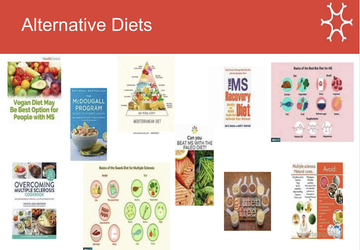Before you watch this webinar
Enhancing your learning experience begins with understanding you better. Collecting data enables us to tailor our educational content specifically for our audience. Discover more about how we handle your information in our Privacy Policy.
Event
Diet & MS: Do we discuss this topic early and regularly enough and what should we advise?
Our sponsor

Case:
A 24 year-old woman with recently diagnosed MS informs you she is going to try a very low-calorie vegetarian gluten-free diet. She has read on social media that this diet is anti-inflammatory. She asks for your advice. What are you going to tell her?
Objective
This webinar will look at the evidence in relation to dietary management.
CPD accreditation
'Diet & MS: Do we discuss this topic early and regularly enough and what should we advise?' has been approved by the Federation of the Royal Colleges of Physicians of the United Kingdom for 1 category 1 (external) CPD credit(s). To claim the credit please email events@neurologyacademy.org.
Presentation slides
Summary
Dr Jonathan White, consultant obstetrician and gynaecologist, and Medical advisor to Overcoming MS began the webinar by discussing his diagnosis with relapsing remitting MS (RRMS) when he was 31. He spoke eloquently about the reality of receiving his diagnosis, and about asking whether there was anything he could do to make a difference to his outcomes - and was told, 'no'.
'I asked, is there anything I need to do, anything I can / should change in my lifestyle to change what this might do to me in the future?...
I was told pretty quickly, to paraphrase, 'There's no evidence for any of that, just choose your medicine and hope for the best'.
And with the greatest of respect, I think that's wrong.'
Jonny shares his thoughts on how the changes in dietary and lifestyle changes in society over the past 100 years, and the increasing prevalence of MS in society must be part of the conversation around MS, ideally at the point of diagnosis but if not, at any point in a person's journey.
He notes that the evidence around diet will be discussed in more detail later in the webinar, and that he personally follows the Overcoming MS lifestyle programme which is a plant-based, whole foods diet with additional seafood. He gave his reasons for choosing to follow the diet, not least of them was the interest in preserving his overall health and preventing future comorbidities.
'The primary reason I chose [the OMS diet] was because the basic science made sense to me; 'unhealthy' fats that were pro-inflammatory and pro-degenerative weren't something I wanted with my pro-inflammatory, pro-degenerative condition… '
One of the reasons I chose it is that it's probably protective against some of the other conditions I might be likely to get as I get older, living in the West and having a typical lifestyle... The more conditions you have while living with MS, the worse your prognosis is and I didn't see any downside in trying to prevent any of the other conditions that might make my MS worse.'
Jonny spoke about the other elements of the OMS programme around stress management and movement. He highlighted that MS does not have a lot of positivity around it, and finding a community of positivity and hope whilst living with MS has its own benefit, including evidence that positivity has a marked effect on the immune system (Barak 2006).
He closed by sharing why the OMS programme is useful within the NHS and to practicing clinicians; firstly noting the simplicity of sharing a weblink to copious amounts of dietary and lifestyle-related support in an overstretched clinic, and secondly highlighting the strong support for the prevention agenda that maintaining a healthy lifestyle undoubtedly enables.
'I take people's criticism that there is no one diet to point to, there is no randomised controlled trial, but my counter to that is that you're going to be waiting a very long time for a randomised control trial in any area of lifestyle.
You must instead look to the highest form of evidence that we can find and that increasingly is there.'
When prompted by Ruth, chairing the webinar, for a take home message around the time of diagnosis, Jonny pressed the importance of written information.
'We probably remember about 30% of what someone tells us at a consultation, and if it's bad maybe only 10% - please give people something written down.'
He also spoke about the power of the 'no-cebo effect' - the detrimental impact of taking away hope from somebody. He was emphatic that, to say there is nothing someone can do to improve their outcomes or quality of life with MS is extremely detrimental, and often inaccurate.
He closed by highlighting that, whilst there is not clear evidence for one diet, there is sufficient evidence for neurological disease, as for heart disease and diabetes, that lifestyle and dietary factors do contribute to outcomes, and that is a positive message for someone newly diagnosed.
Consultant neurologist Dr Kate Petherham spoke next, providing a whistlestop tour through the evidence-base for diet in MS, by using a case study.
Kate agreed with Jonny that clinic times are constrained and that often, discussions about diet and lifestyle come at the end of a potentially difficult discussion around diagnosis and treatment decisions, which impacts any additional discussion.
'But this is an opportunity that we need to grasp to engage with patients, and a potential to improve health outcomes, not just from their MS but from other risk factors. We do have a responsibility to be at least aware of the evidence that's out there.'
Kate reminded attendees that diet can be an emotive subject for many reasons and to bear that in mind.
Some of the key reasons that diet is important to address in those with MS include:
- Obesity is increasingly a recognised risk for MS although why is not clear
- Diabetes and high cholesterol are more prevalent within the MS population and are associated with poorer outcomes
- It has been well-recognised since the 1940's (Swank 1953) that diet has a potential to be disease-modulating, with interest that metabolites impact on the immune system and inflammation and this can be derived from diet directly or from a gut microbiota distinguished from a diet.
- It is not just about disease modification but symptom management - dietary factors can impact mood, fatigue and emotional wellbeing, and effects on bowel and bladder function.
Kate noted the likelihood of patients 'Googling' the best diet for MS and remarked on the flood of information that can come through with potentially frightening titles. She shared the need for healthcare professionals to help navigate patients through this mass of information.
Kate utilised the case study of a patient requesting information on a low calorie, vegetarian gluten free diet and addressed the evidence-base for each element of this diet in turn.
Low calorie:
- There is evidence in animal models that mice with strict calorie restriction had a less aggressive course in demyelination but strict calorie striction is difficult to maintain over time.
- Intermittent fasting: in non-MS patients have been found to reduce markers of inflammation. In mice-models, intermittent fasting reduced demyelination, inflammation and axonal damage. Some studies have shown improvement in fatigue and emotional health.
- Diets create changes in gut microbiota, an increasing area of research in MS. Gut flora can be either pro-inflammatory or anti-inflammatory and this can be altered dramatically by what we eat.
- Ketogenic diet - high fat, low carbohydrate diet causing a shift from using glucose as energy to using fats as energy, which creates ketones. These cross the blood/brain barrier and have a potential anti-inflammatory and neuroprotective effect with a few studies showing positive effects in MS (Bahr 2020).
Vegetarian or plant-based
- Lots of the MS diets are plant-based, built on evidence for pro-inflammation that can be caused by long-chain fatty acids as found in red meats as opposed to anti-inflammation caused by short-chain fatty acids as found in plant-based foods.
- There are 'good fats' and 'bad fats' - polyunsaturated fats such as those found in fish, walnuts and flaxseed are potentially anti-inflammatory and may promote remyelination.
- High levels of fibre from vegetables and fruit are potentially beneficial to the gut microbiota and in turn anti-inflammatory (Yadav 2016).
Dairy restriction
- Evidence in favour of dairy restriction tends to be due to the high level of fat found in whole cow's milk related to potential inflammation, as well as a study which found a possible link between high levels of milk consumption in adolescence and an increased risk of developing MS.
- There is also an increased response in T-cells to milk antigens with a particular milk protein linked to mimicry of MS, with myelin oligodendrocyte glycoprotein (MOG) found in cases of Experimental autoimmune encephalomyelitis (EAE).
- Contradictory findings in epidemiological studies with HOLISM data suggesting people abstaining from dairy products have better outcomes but the NARCOMs registry finding the contrary.
Gluten-free
- There has not been any link found between coeliac disease and MS to date.
- Predominant argument for a gluten free diet for MS comes from a small study of 72 people with RRMS which found beneficial EDSS and MRI outcomes.
- The Wahl's Protocol (another lifestyle-related MS management programme) excludes grains and follows a paleolithic, ketogenic approach and evidence for improved outcomes (Wahls 2021) may be related to the ketogenic style rather than an absence of grain.
- NARCOMs registry suggested inverse evidence, with a positive relationship between grain and MS proposed, potentially due to the beneficial effect of high fibre on the gut microbiome.
Kate highlighted the importance of individualised and tailored requirements of people, that there is no 'one size fits all' and that personalised diets meeting people's individual gut microbiota and health needs may be on the horizon.
She concluded that, whilst the case study diet is lacking in a clear evidence base across people with MS:
- there is clear evidence that diet quality is associated with MS outcomes (Fitzgerald 2018)
- the Western diet with its high levels of saturated fats, processed food, salt and sugar is potentially harmful
- diets high in natural, high-fibre vegetables, fruits and grains have a potentially positive effect on the microbiome and may be anti-inflammatory.
Kate closed her talk by referring to the Mediterranean diet which is low in processed foods, high in 'good' fats, low in 'bad' fats, high in fruit and vegetables, and which is well supported in literature around aging well.

Kate was very clear that her own personal approach to supporting people with MS is about a complete healthy lifestyle rather than exclusion diets which may limit people's nutritional health. She was emphatic about the importance of vitamin D supplementation, and shared recent evidence that low-moderate coffee intake and some chocolate have been found to support cognition and fatigue in people with MS.
Farah Suleman, senior neuroscience dietitian also used the case study to frame her discussion, considering some of the alternative diets that people may be choosing to follow, and to consider the question of whether we discuss diet early enough, and some of the nutritional challenges that patients with MS may face.

Farah suggested that as a dietician, she sees the greatest number of alternative diets amongst MS patients, and that it is essential to find a way to best support people in their chosen diet whilst helping them with their overall balance of nutrition.
'On closer inspection of these various diets, there are commonalities that emerge… there are obstacles we need to overcome - by restricting one food group or area, it is important that patients balance this with an alternative choice to ensure they maintain nutritional balance.'
Challenges in ensuring nutritional balance when excluding particular foods or food groups can include cost, access and bioavailability. Planning meals around other family members, and preparation of fresh foods when considering levels of fatigue can also be challenging. Farah also noted that there can be a reliance on supplements which may be costly, variable in quality or varying in bioavailability.
Farah mentioned practical challenges around people in in-patient settings such as post-relapse. Individuals may have increased nutritional needs in these circumstances, hospital catering may struggle to provide adequately for them, and during the pandemic especially, bringing food from home has been difficult. She was clear that having clear discussions about the pros and cons of a nutritional decision, such as whether to accept a supplement or enteral feeding in these circumstances, is essential, and that the goal is to enable the patient to make an informed decision.
Farah agreed that many of the elements of some of the alternative diets are in line with a strong evidence-base in favour of reduction of processed foods and saturated fats,
as supported by the Mediterranean diet and the 'Eat Well guide' promoted by the NHS (2018).
'Looking beyond the MS itself at general health and wellbeing is important, as well as at symptom management - so adequate carbohydrate to maintain energy levels, high fibre to promote healthy bowels, a healthy weight, reducing risk of osteoporosis, and managing cardiovascular risk factors.'
Farah flipped to discussion then, and spoke about considering MS and its symptoms and how this can alter nutritional status and wellbeing:
- Symptoms impacting on nutritional status, including fatigue, cognition, eyesight, physical difficulties, which may impact the planning and preparation of food as well as eating or drinking itself.
- Malnutrition, weight loss and cachexia can compound existing symptoms such as fatigue, cognition and muscle function, and impair the immune system.
- Dysphagia can be experienced by c40% of people with MS, further impacting their nutritional options.
'These challenges are progressive - because we know that as MS progresses, so do the challenges along the way. Having a proactive approach to nutrition rather than a reactive approach, the hope is that diet and nutrition can play a better role in improving the management of MS.'
When asked what healthcare professionals can do where they do not have access to a specialist dietician, Farah recommended monitoring patient's height and weight, to signpost patients to useful information such as the MS Trust's dietary information, and to encourage people with MS to monitor changes in themselves to ensure early referral for individualised advice from a dietician is possible.
References and links
Bahr LS, Bock M, Liebscher D, Bellmann-Strobl J, Franz L, Prüß A, Schumann D, Piper SK, Kessler CS, Steckhan N, Michalsen A, Paul F, Mähler A. Ketogenic diet and fasting diet as Nutritional Approaches in Multiple Sclerosis (NAMS): protocol of a randomized controlled study. Trials. 2020 Jan 2;21(1):3. doi: 10.1186/s13063-019-3928-9. PMID: 31898518; PMCID: PMC6941322.
Barak Y. The immune system and happiness. Autoimmun Rev. 2006 Oct;5(8):523-7. doi: 10.1016/j.autrev.2006.02.010. Epub 2006 Mar 21. PMID: 17027886.
Fitzgerald KC, Tyry T, Salter A, Cofield SS, Cutter G, Fox R, Marrie RA. Diet quality is associated with disability and symptom severity in multiple sclerosis. Neurology. 2018 Jan 2;90(1):e1-e11. doi: 10.1212/WNL.0000000000004768. Epub 2017 Dec 6. PMID: 29212827.
Martinez-Gonzalez MA, Martin-Calvo N. Mediterranean diet and life expectancy; beyond olive oil, fruits, and vegetables. Curr Opin Clin Nutr Metab Care. 2016;19(6):401-407. doi:10.1097/MCO.0000000000000316
NARCOMs registry for Multiple Sclerosis accessed https://www.narcoms.org/
Overcoming MS website accessed https://overcomingms.org/
Public Health England, 'The Eatwell guide; Helping you eat a healthy, balanced diet', Crown copyright 2018
Swank RL. Treatment of multiple sclerosis with low-fat diet. AMA Arch Neurol Psychiatry. 1953 Jan;69(1):91-103. doi: 10.1001/archneurpsyc.1953.02320250097011
Wahls TL, Titcomb TJ, Bisht B, et al. Impact of the Swank and Wahls elimination dietary interventions on fatigue and quality of life in relapsing-remitting multiple sclerosis: The WAVES randomized parallel-arm clinical trial. Mult Scler J Exp Transl Clin. 2021;7(3):20552173211035399. Published 2021 Jul 31. doi:10.1177/20552173211035399
Weiland TJ, De Livera AM, Brown CR, et al. Health Outcomes and Lifestyle in a Sample of People With Multiple Sclerosis (HOLISM): Longitudinal and Validation Cohorts. Front Neurol. 2018;9:1074. Published 2018 Dec 12. doi:10.3389/fneur.2018.01074 (most recent publication from the HOLISM study )
Yadav V, Marracci G, Kim E, Spain R, Cameron M, Overs S, Riddehough A, Li DK, McDougall J, Lovera J, Murchison C, Bourdette D. Low-fat, plant-based diet in multiple sclerosis: A randomized controlled trial. Mult Scler Relat Disord. 2016 Sep;9:80-90. doi: 10.1016/j.msard.2016.07.001. Epub 2016 Jul 6. PMID: 27645350.
Wahls Protocol web reference for overall protocol accessed https://terrywahls.com/ (WAVES citation above)
Podcast
Our Multiple Sclerosis webinars are available on SoundCloud:
soundcloud.com/neurologyacademy
Our sponsor

Chair
 Ruth Stross
Ruth StrossDirector of services, MS Trust
Speakers
 Dr Kate Petheram
Dr Kate PetheramConsultant neurologist, South Tyneside & Sunderland NHS Foundation Trust
 Dr Jonathan White
Dr Jonathan WhiteMedical advisor & event facilitator, Overcoming MS
 Farah Suleman
Farah SulemanSenior Neuroscience Dietitian, University Hospitals Birmingham NHS Foundation Trust
Encouraging excellence, developing leaders, inspiring change
MS Academy was established in 2016 and in that time has accomplished a huge amount with exciting feedback demonstrating delegates feel inspired and energised along their personal and service development journeys. The various different levels of specialist MS training we offer are dedicated to case-based learning and practical application of cutting edge research.